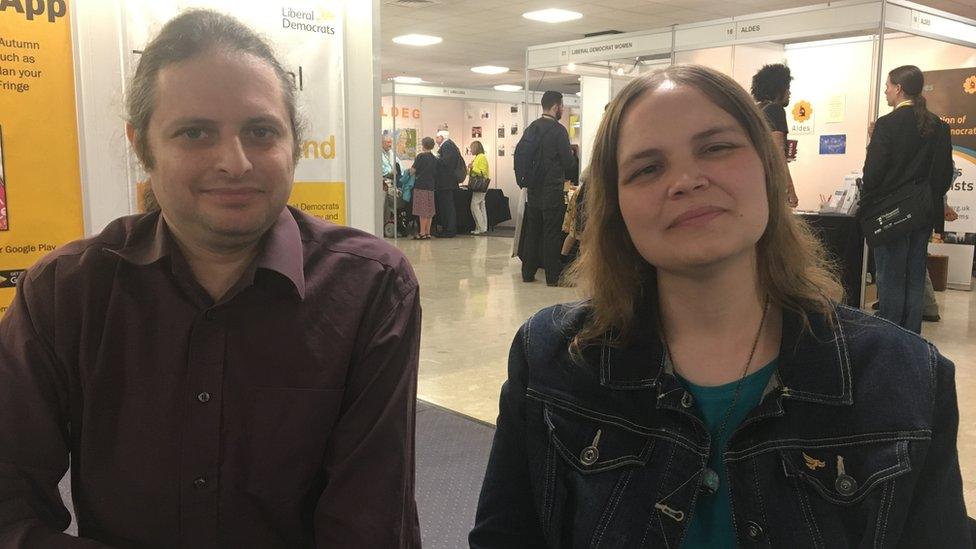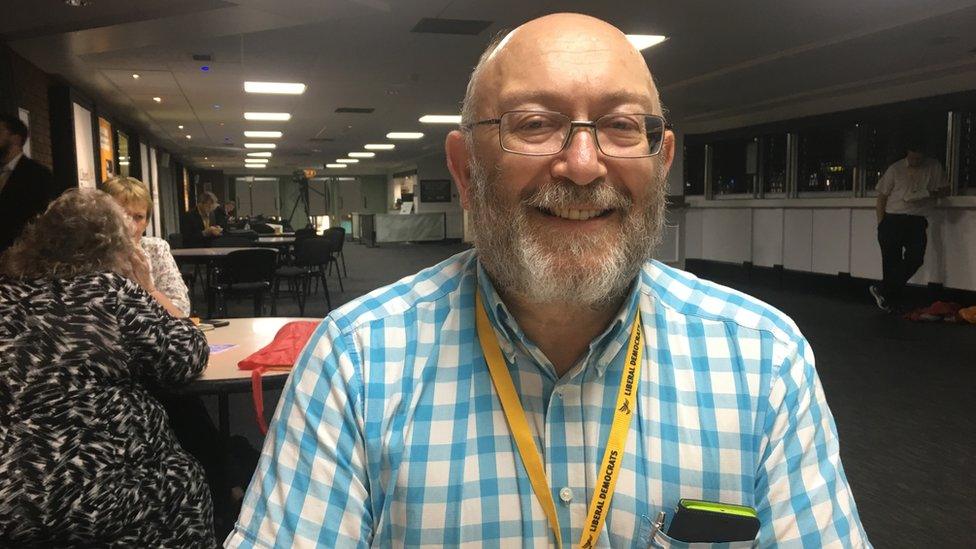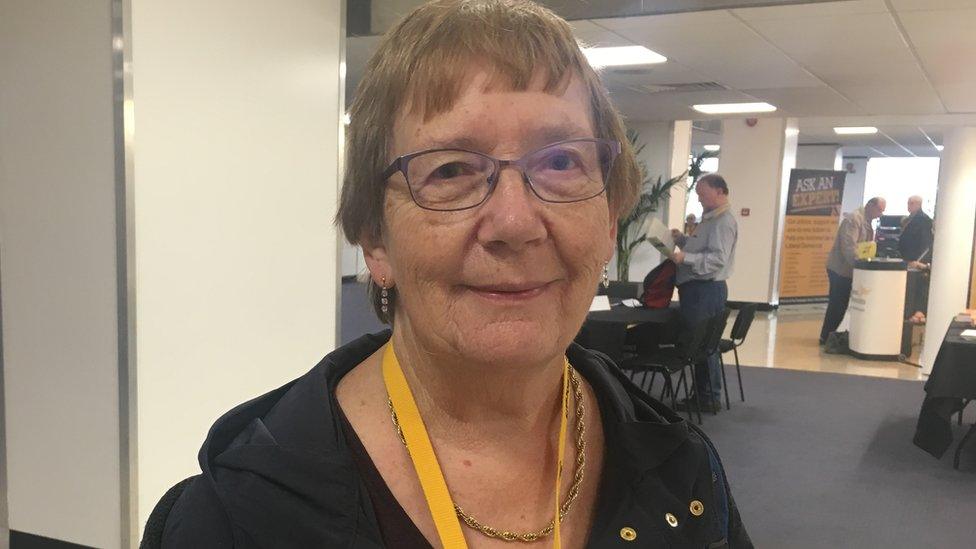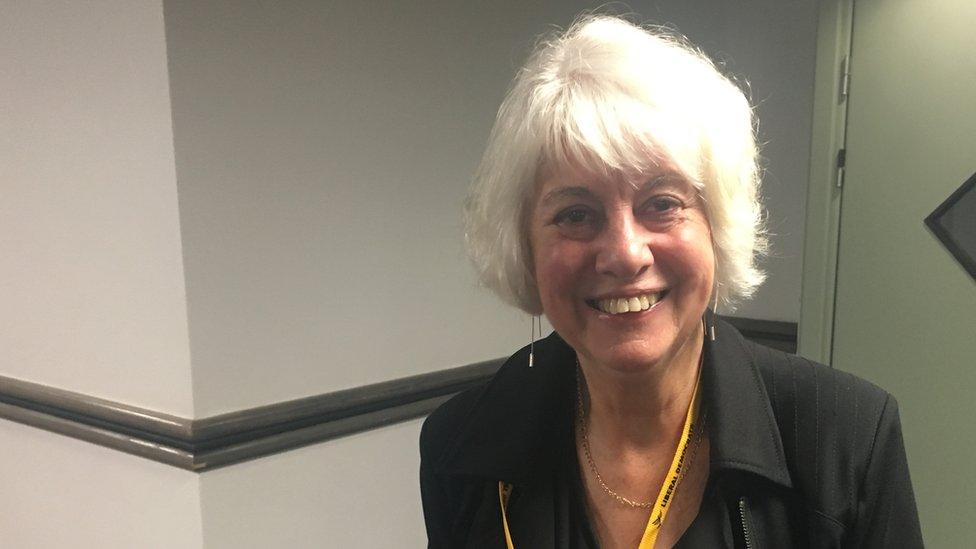Do Lib Dems want a new centre-left party?
- Published
What do Lib Dem members think about the idea of a new centre-left party in British politics?

Adam Bernard and Lisa-Maria Bornemann
"I am not an incredible enthusiast of that idea," Adam Bernard, from Harrow, tells me.
A long-standing Liberal Democrat member - since 1997 - he says Labour, founded on socialism, and the Lib Dems, founded on liberalism, stand for different things.
While there's "common ground" - and lots of areas where the parties should work together to oppose Tory policies - "losing our identity as different parties with different policies is not the way to go", he says.
And he thinks it is a move that would not sit well with voters: "The people who vote for these different parties would be right to be indignant that their choice has been taken away."
Adam also says he's not a fan of electoral pacts which would see other centre-left candidates step down in favour of the one deemed to stand the most chance of winning in a specific area.
"I don't think that taking away the Green candidate and expecting that they will follow orders and jump into line behind us, I think it's slightly presumptuous, I think it's slightly insulting and I don't think it's liberal."
"A sensible electoral system would be much more the answer so that we could work together," he adds, rather than damaging each other's vote in the first-past-the-post system where the winner takes all.

Leon Duveen
Leon Duveen, Lib Dem parliamentary candidate for Bassetlaw, thinks it's an idea that "won't get any support" from party members.
And he also thinks there a risk it could put Liberal Democrat voters off.
"We are a separate party, but we are very willing to work with other parties on issues," he tells me.
He can conceive of there being unofficial electoral pacts in some local areas, where parties lend their support to the centre-left candidate deemed most likely to win in that area.
But certainly nothing official: "When it comes to elections we will stand separately because we are Liberal Democrats and we want to get Liberal Democrats elected."
On the party's future prospects, he said it is quite hard to say as the next general election, scheduled in 2020, is so far away.
He is sure, though, that it will improve on its 2015 general election performance, although he admits that is "not hard, I know", and predicts it will return up to 30 MPs to Parliament.
'Got some legs'
Antony Power, from South Hams and Brixton, joined the party after the 2015 general election, disappointed with the majority Conservative government.
It is therefore his first conference; so how's he finding it? "It's very interesting. It's been good so far," he tells me.
As a new member, what does he make of the idea of a new-centre-left party?
"It's got some legs," in terms of getting the centre-left voice out there more, he says, but he has "serious doubts" about whether it would work.
Antony says there's "a lot of synergy" between the Lib Dems and elements of the Labour Party and the "left wing" of the Conservative Party, but he suggests people are put off from joining because they don't want to "sit in opposition" or "struggle to get elected.
"I don't think the majority of people from Labour or Conservatives would come across because when I speak to those sorts of people the reason that they are Conservatives or in the Labour Party is because they perceive a lot more chance of getting in to power by doing that than following their true belief of being a Liberal Democrat."
However, he does think that if Jeremy Corbyn is re-elected as leader and the party shifts further to the left it will "disenfranchise a lot of its supporters" who may then switch to the Liberal Democrats.
'Preserve our identity'
Lisa-Maria Bornemann, also from Harrow, is a new joiner to the Lib Dems - since the 2015 general election.
She thinks the party should be "working together a lot" with others on the centre-left of politics.
But it should not be "merging" with any other parties as it risked "compromising our individual position".
She says the party has made "good progress" in recent by-elections and thinks it is "on the way back". But she concedes that the Lib Dems are unlikely to recover fully by the time of the 2020 election.
"That would be quite idealistic to think," she says.
She believes that the party needs to work on its individual presence and make sure the public understands what it stands for,
"We're stuck at 'we lost the election in 2015 and disappeared off the face of the earth'," she says. "We have not, but that's a way a lot of people see us."

Brenda Smith
Brenda Smith is from the New Forest. I ask her how long she's been a member, and she pauses to think. "Oh... that tells you how long. Probably in excess of 30 years", she says, explaining that she was a member of the Liberal Party before the Liberal Democrats.
"I would rather we kept our own identity because I think you would struggle to find enough common ground to unite enough people for enough time," she says.
While there is "probably much of the time more that unites us than divides us" on the centre-left, "I think there will equally be a number of very unhappy people who will just desert or become inactive" if the party merged with others.
"So whilst I would look forward to useful co-operative relationships I think anything more formal than that would struggle."
Recalling the Conservative-Lib Dem coalition, Brenda suggests that many Lib Dems would be "exceptionally wary" of doing anything over which it did not have full independence and which diluted its influence.

Jenny Pinkett
That's a view also held by Jenny Pinkett, from Tamworth, who says she's "very cautious" of alliances as "you can lose your distinctive message".
Jenny says the coalition was "too distinctly Conservative" and the Lib Dem message "wasn't coming through", which she believes contributed to the party's poor election result, which saw it reduced to just eight MPs.
A party member since 1987, she tells me she doesn't think there is a need for a new centre-left party "when we've got the Liberal Democrats".
"We are there. We're a centrist party," she says, adding: "Anybody is welcome to join us."
"We are distinctly Liberal Democrats and that's the way Liberal Democrats should be."